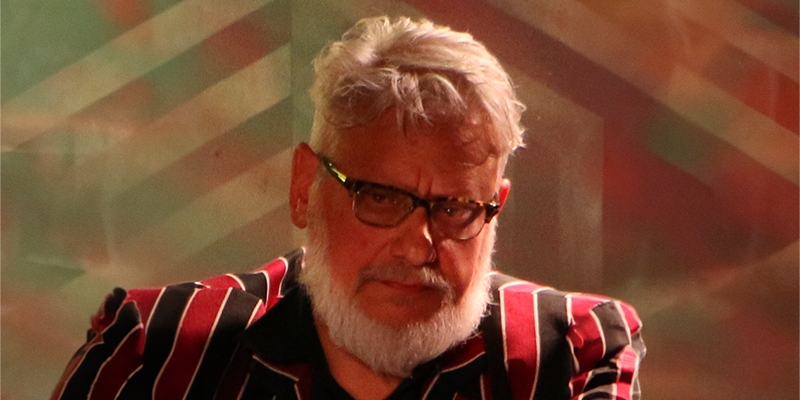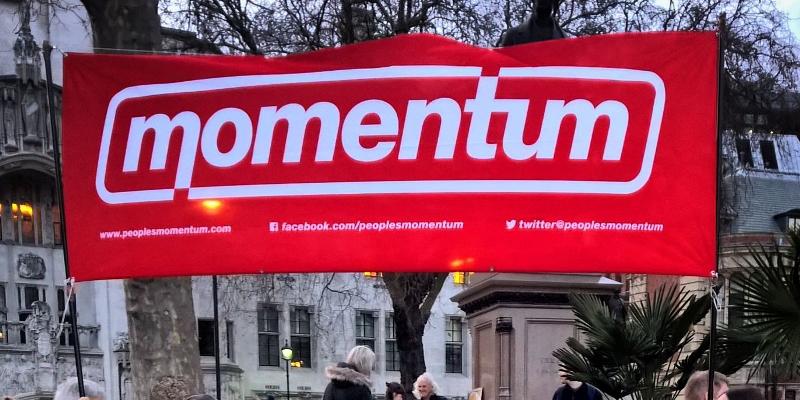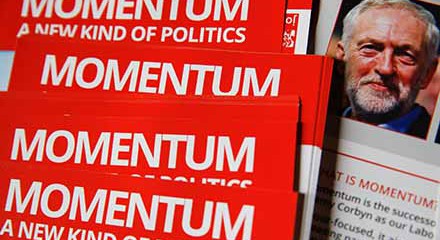Carla Roberts wishes she was surprised that Jon Lansman has joined the Jewish Labour Movement
A psychologist might explain Jon Lansman’s decision to join the Jewish Labour Movement at the end of 2023 as some kind of an attempt to escape trauma, stress and anger by regressing to his Zionist roots and Orthodox Jewish upbringing, including his much romanticised stay on a kibbutz at the age of 16. After all Lansman has seen his world come crashing down. Jeremy Corbyn’s leadership of the Labour Party ended in a humiliating general election defeat. Embracing big business, Sir Keir Starmer has junked almost everything from the 2017 and 2019 ‘socialist’ manifestos, and if that were not bad enough, in July 2020 Lansman found himself replaced as chair of Momentum by a firefighter and a climate activist.
But joining JLM is still an odd choice. After all, JLM was one of the key organisations behind the defeat of the Corbyn movement. As an official affiliate of the World Zionist Movement and sister party of Israel’s Labor Party (Havodah), the JLM worked tirelessly to smear Corbyn and the left by making bogus claim after bogus claim about the supposed anti-Semitism problem in the party. The bourgeois press and the right in the party eagerly lapped up their nonsense, no matter how ridiculous or weaponised.
Surely, as one of Corbyn’s “key allies” and decades-long leader of the Campaign for Labour Party Democracy, Lansman must know what a despicable role the JLM played in destroying the Labour left’s biggest opportunity in a lifetime? Corbyn put him in charge of setting up Momentum, so how could Lansman be so disloyal now and join the very organisation that helped bring him down?
The sad truth is that this was a long time coming. And it is not just down to Lansman’s soft Zionism. It is a reflection of the total bankruptcy of the strategy of the entire official Labour left.
From the CLPD and Momentum via the slightly less horrid Labour Representation Committee to the various bitty groups represented in the Centre-Left Grassroots Alliance: they all operate under the illusion that the Labour left needs to make peace with the ‘centre’ of the party.
Lansman is a long-time admirer of Vladimir Derer, the founder of CLPD, who he considers his political mentor: “Like Momentum, CLPD is an organisation which seeks to democratise the Labour Party, not to operate like a party-within-a-party. Similarly, Vladimir [Derer] was determined for CLPD to reach out to the centre of the party, since without doing so we would inevitably lose. The same is true for Momentum now”, he wrote in 2017[1].
‘Winning’, for Lansman and the rest of the official Labour left, of course means Labour winning a general election (under any leader, no matter their politics) and forming a government – not winning the civil war in the Labour Party.
This is why Corbyn bent over backwards to appease the right inside and outside the Labour Party. And that is also the reason why Lansman closed down democracy in Momentum at the end of 2016. Lansman (and, sadly, Corbyn) never meant for Momentum to become a fighting organisation. He told the Jewish Chronicle at the beginning of 2023: “I wish we’d never had Momentum branches. It was never our decision to set them up – they set themselves up.”[2] But he certainly did his best to clamp down on them, not least by imposing his outrageously undemocratic constitution in a cloak-and-dagger-operation otherwise known as the ‘Lansman coup’.
With the full support of Jeremy Corbyn, John McDonnell, Diane Abbott and others in the Socialist Campaign Group of Labour MPs he went on to cancel preparations for Momentum’s national launch conference, abolish the regions and downgrade the role of local groups. Lansman used a members’ survey to claim endorsement for his new constitution, ensuring he kept control of what was his private property, while also sneaking in a clause that banned from membership all those who had been expelled in the witch-hunt against Corbyn and the left. Although Lansman has since been ousted from Momentum, this clause remains intact and continues to be enforced by the all-new leadership of wannabe Labour bureaucrats.
Zero tolerance
In other words, Lansman might not have started the witch-hunt against the left, but he certainly enforced it. While maintaining that he supported Corbyn “100 percent”, he was always keen to state his view that there should be “zero tolerance” towards anti-Semitism.
From a communist point of view, zero tolerance towards any form of prejudice is entirely the wrong approach – we much prefer education and debate to convince people of their wrong ideas rather than tell them that they are ‘beyond the pale’. After all, there is a lot of prejudice, whacky ideas and racism within society – they are part and parcel of the capitalist class society we live in. We want to win people over and convince them that socialism and communism has something to offer them.
The problems with the strategy of trying to appease the right in the Labour Party are all too obvious.For a start, it is debatable how much better off the working class is under a rightwing Labour government of the Blair or Starmer variety: the self-censored left moans quietly about this war or that attack on the working class, while waiting for “the unions” to do something, anything.
And once you actually have a leftwinger in as leader, as happened by pure accident with Corbyn, the whole strategy quickly falls apart. The centre-right clearly had no interest in being appeased. There was no way they would have supported Corbyn as prime minister. They would have continued to plot, to sabotage, to undermine. Everybody could see it – apart from those on the official left who continued, right to the bitter end, trying to win them over by securing them in their cushy positions, be it in the regional offices, the CLPs or as MPs … all the while pointing their fingers at so-called ‘anti-Semites’ and keeping their cowardly distance from the victims of the witch-hunt (“we can’t have a suspended or expelled member speak on the platform”). This, sadly, included the Corbyn leadership itself, which – under its general secretary, Jennie Formby – vilified and smeared good comrades like Chris Williamson, Tony Greenstein, Marc Wadsworth and Jackie Walker.
Yes, Lansman is a touch worse than your garden-variety official Labour leftie, because his soft Zionism also made him a keen supporter of the much-criticised, fake definition of anti-Semitism promoted by the International Holocaust Remembrance Alliance and adopted by the Labour Party under Corbyn (who made a half-hearted attempt to oppose it, but without publicly distancing himself in some sort of campaign, he had no chance).
Lansman fully embraced the attempt by the Israel lobby to redefine what anti-Semitism is: not hatred or discrimination of Jewish people, but criticism of Israel. He has stated, for example, that formulations like “I hate Israel” are not expressions of anti-Zionism, but are “clearly anti-Semitic”.[3]
He was more than happy to sell out Corbyn supporters and, pressed by Stella Creasy and Louise Ellman at the 2023 JLM conference, was quick to point to “anti-Semitic left activists around the country”, in particular those “in Riverside and Liverpool.”[4]
No wonder that he ended up joining Corbyn’s enemies in the JLM.
Lansman’s Zionism is very similar to his Labourism: he appeals to the sensible ‘centre-ground’ – which in reality means support for the hard right. In an interview with The Guardian in November for example, he expressed “sympathy” for Keir Starmer’s conclusion that calling for a ceasefire now in Gaza is wrong: “A ceasefire now could merely sustain Hamas as a continuing threat.”[5]
You see, “Israelis and Palestinians have been betrayed by their leaders – each side needs a new leader as soon as possible, each of whom wants peace and has the confidence of their own people!”, he recently tweeted.
Leaving aside the obvious contradiction of the latter (nobody who is calling for “peace” at the moment has the “confidence” of the majority of either population), his whole political outlook echoes the dumb ‘bad apples on both sides’ of the establishment media. He has been sharing dozens of tweets by Standing Together[6], a campaign of Jews and Arabs living in Israel, which has been promoted in Britain by Nadia Whittome MP, fellow traveller of the pro-imperialist and pro-Zionist Alliance for Workers’ Liberty. The campaign still peddles the illusion that there could be a capitalist ‘two-state solution’, when clearly no mainstream politician in Israel has any real interest in it whatsoever (Labor’s Merav Michaeli pays mere lip service to the idea).
Standing Together focuses on “de‑escalation and solidarity within Israel” by offering hotlines, workshops and other such worthy things, run by Jews and Arabs. Their mission statement reads like the naive wish list of a 14-year-old who just ‘wants peace’. It is appealing to those in charge to be a bit nicer to the Palestinians and stop supporting illegal settlements on the West Bank. But the campaign makes no demands, for example, to change any of the racist laws that condemn Arabs within Israel to second class citizenship.
For Standing Together, the root of the problem is not Zionism or the structures of state oppression. It is just that for some unfathomable reason Jews and non-Jews don’t seem to get on too well in Israel. Something a de-escalation course or, indeed, a new set of leaders who “want peace” are unlikely to fix.
Lansman is not a stupid man, so he knows all of that. But just like in the Labour Party, he wants to leave the structures of inequality intact. His main problem is that he has no confidence in his vision of socialism or, indeed, in the working class as the only force that can overthrow capitalism and liberate humanity.
We would not be surprised if Lansman was rewarded for services rendered with an OBE, a CBE or even a KBE by Sir Keir at some point in the next few years (presuming a Tory general election defeat). One thing is for sure, though, Lansman has not only joined the JLM, he has joined the ranks of the living dead.
Labour Marxists
Of course, while Lansman has betrayed himself, what took him to there is far from unique. I have come across quite a few self-declared “Marxists” in the Labour Representation Committee who will quote this infamous passage from the Communist Manifesto to justify their opposition to ever building a Marxist Party: “The Communists do not form a separate party opposed to the other working-class parties. They have no interests separate and apart from those of the proletariat as a whole.”
Very odd, isn’t it, that a booklet with the full title The Manifesto of the Communist Party, written by Marx and Engels as a political programme for the Communist League (described by Engels as “the Communist Party in process of formation”) should argue against forming – a Communist Party!
Because Marx and Engels did no such thing. The German original makes it clear that in fact they said the exact opposite: “Die Kommunisten sind keine besondere Partei gegenüber den anderen Arbeiterparteien. Sie haben keine von den Interessen des ganzen Proletariats getrennten Interessen.”[7]
Hal Draper translates it as follows: “The Communists are not a special party vis-à-vis the other workers’ parties. They have no interests separate from the interests of the whole proletariat.”
In other words, communists do form a separate party – but they do work and engage with other working class parties, because they are trying to equip them with a winning strategy for socialism.
Despite the fact that this was laid out in detail in 1994 in Hal Draper’s very entertaining book The adventures of the Communist Manifesto (which pointed out many other mistranslations and misreadings), the official Labour left continues to ignore his important work – and continues to misquote Marx and Engels. A fig leaf for their own political cowardice l
[1]. www.workersliberty.org/story/2017-07-26/debate-about-momentum-martin-thomas-answers-jon-lansman.
[2]. www.thejc.com/news/momentum-founder-refuses-to-apologise-for-hatred-of-activists-ewz4c5qb.
[3]. www.youtube.com/watch?v=mlZ7Zcoi8wU.
[4]. www.thejc.com/news/momentum-founder-refuses-to-apologise-for-hatred-of-activists-ewz4c5qb.
[5]. www.theguardian.com/politics/2023/nov/12/momentum-founder-jon-lansman-says-leftwingers-in-denial-about-pro-palestinian-slogans.
[6]. www.standing-together.org/en.
[7]. www.marxists.org/deutsch/archiv/marx-engels/1848/manifest/2-prolkomm.htm.




